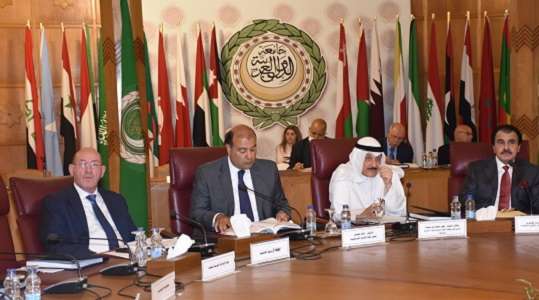The Secretary-General of the Union of Arab Chambers, Dr. Khaled Hanafi, participated in the launching ceremony of the League of Arab States, the Unified Arab Economic Report for the year 2021, at the headquarters of the League’s General Secretariat in Cairo - the Arab Republic of Egypt. In the presence of the Assistant Secretary-General for Economic Affairs Mubarak Al-Hajri, Secretary-General of the Organization of Arab Petroleum Exporting Countries "OAPEC" Ali Sabt Bin Sabt, the Ambassador of the Republic of Lebanon to Egypt and its permanent representative to the League of Arab States, Ambassador Ali Al-Halabi, and the Deputy Permanent Representative of Egypt to the Arab League, Minister Plenipotentiary Ihab Suleiman; and a group of diplomats.
During the ceremony, a visual presentation was presented by the General Secretariat of the Arab League on the content of the unified Arab economic report; the Organization of Arab Petroleum Exporting Countries (OAPEC) also made a visual presentation on the fifth chapter of the report on energy.
Khaled Hanafi stressed that the report is a new fruit of joint Arab economic cooperation, as it is an important economic document at a time when the global economy is witnessing the repercussions of political crises, wars and economic crises that are almost ravaging the economies of countries. Considering that our Arab countries are not immune from these challenges, which necessitates concerted and unified efforts among the countries of the Arab region and to achieve more joint cooperation between Arab labor organizations to confront these challenges of unemployment and poverty, and the dwindling of industrial exports with high added value and others.
He pointed to the “importance and pivotal role of the Arab private sector in terms of raising the level of GDP, as the Arab private sector contributes 75 percent of GDP, and also contributes the same percentage in terms of creating job opportunities, hence, it is necessary to combine efforts and form economic blocs that support each other. In addition to increasing the rates of economic and trade cooperation and integration among them to reduce the expected economic risks.”
On the other hand, Hanafi noted that “Many Arab countries, including the Arab Republic of Egypt, have begun to give the private sector an important and effective role, to this end, Egypt is preparing to launch the "State Ownership Document", which is a strategic shift in terms of enhancing the role of the economy, as this document aims to increase the participation of the private sector in investments by 65 percent over the next three years, this is extremely important, as private sector investments do not in any way affect the economic presence of countries, but on the contrary, it will have a positive impact on the economic reality of the country, within the framework of strengthening the partnership between the public and private sectors.”
Hanafi praised “Egypt's tendency to launch the state ownership document, considering that the launch of this document is an important national achievement, in addition to the achievements of His Excellency President Abdel Fattah Al-Sisi, who since taking power, he sought to maximize the role of the private sector," stressing that "in light of the transformations and challenges the world is facing, new decisions must be issued in line with these changes."
He said, “The world map is being re-formed in light of the current crisis and the document aims at regulating markets and promoting competition, in addition to strengthening the role of the private sector to return to economic leadership, with the importance here that the state’s role in this field will act as a regulator and watchdog to ensure balance, justice and fair competition within the Egyptian economy.”
Source (Union of Arab Chambers)

